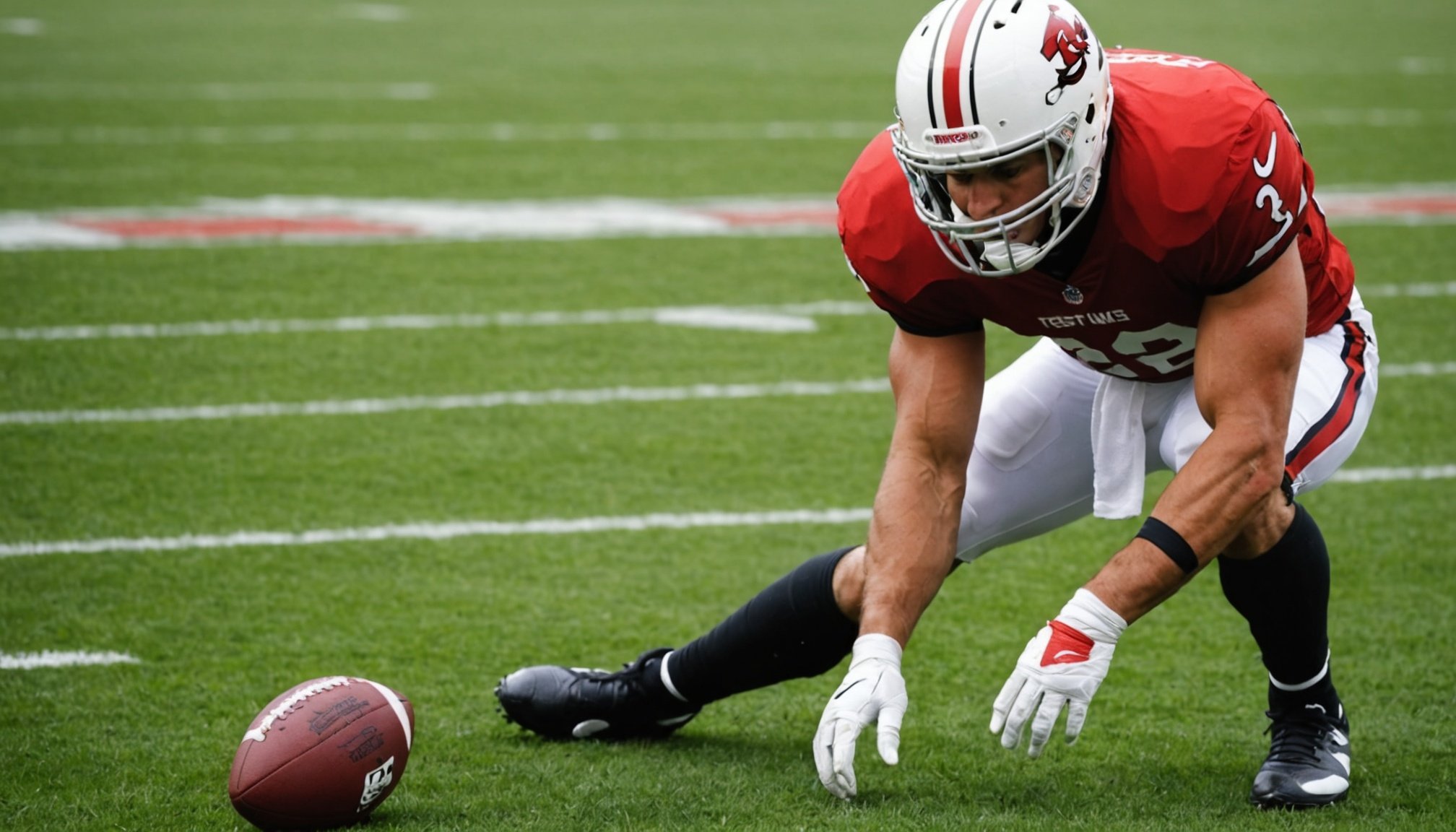Overview of Muscle Tear Recovery for Football Players
Muscle tears can significantly affect a football player’s performance, often leading to time away from the game for adequate recovery. Understanding the nature of a muscle tear is crucial. This injury occurs when muscle fibres overstretch or tear due to excessive strain or overuse. Recovery is multifaceted, requiring a strategic approach that includes rest, rehabilitation, and proper football nutrition.
In the early stages, rest is paramount, allowing the injury to begin healing naturally. Nutrition plays a vital role during this period, supporting the body’s natural repair processes. Key nutrients include protein, to aid in muscle repair, and omega-3 fatty acids, which can help reduce inflammation.
Also to see : Exploring the Influence of Regulatory Shifts on Football Coaching Strategies Across the UK
The recovery process timeline varies depending on the severity of the tear. Minor tears might take a few weeks, whereas severe tears could require months. During these stages, dietary needs will shift to support ongoing healing and recovery. Adequate protein intake remains essential, alongside carbohydrates to provide energy necessary for rehabilitation exercises.
In summary, a robust recovery process for muscle tears demands a balanced approach to rest and nutrition, enabling football players to return to the pitch both stronger and healthier.
Also to discover : Top Cooling Down Techniques for Football Players Post-Intense Training: Boost Recovery and Performance
Key Nutrients for Muscle Recovery
Efficient muscle recovery relies heavily on the right nutrients. Among these, protein stands out as essential for muscle repair and growth. After a workout, muscles undergo stress and damage on a microscopic level, and protein provides the building blocks—amino acids—needed for tissues to repair and strengthen.
Beyond protein, certain vitamins and minerals play critical roles in recovery. Vitamin C, renowned for its immune-boosting properties, also aids in the synthesis of collagen—a vital component in repairing muscle tissues. Meanwhile, Vitamin D supports muscle function, and studies suggest it enhances muscle strength and reduces recovery time.
Magnesium is another nutrient that shouldn’t be overlooked. It helps decrease muscle soreness by promoting flexibility and reducing inflammation. Speaking of inflammation, antioxidants like those found in berries or green tea can combat oxidative stress and potentially alleviate inflammation, speeding up the recovery process.
- Protein for muscle repair
- Vitamin C and Vitamin D for recovery enhancement
- Magnesium for reducing muscle soreness
- Antioxidants for inflammation reduction
Incorporating a balanced mix of these nutrients into your diet can significantly enhance muscle recovery, helping you bounce back faster after strenuous workouts.
Recommended Dietary Changes
Adapting a post-game dietary modification can significantly aid in a football player’s recovery. Proper meal planning plays a crucial role in enhancing performance and speeding up recovery.
Importance of a High-Protein Diet
A high-protein diet is essential for muscle repair and recovery after intense sports activities. Incorporating lean proteins such as chicken, fish, and tofu supports muscle regeneration. The consumption of protein-rich foods approximately within 30 minutes post-workout is optimal for muscle synthesis.
Incorporating Anti-Inflammatory Foods
Anti-inflammatory foods are beneficial in reducing exercise-induced inflammation and promoting faster recovery. Including foods like berries, leafy greens, and fatty fish can help counteract inflammation. These foods are packed with antioxidants and omega-3 fatty acids, making them effective choices for meal planning.
Adjusting Macronutrient Ratios
Adjusting macronutrient ratios is crucial for tailored recovery. Emphasising lean proteins, whole grains, and healthy fats can facilitate optimal recovery. Whole grains provide essential carbohydrates, whereas healthy fats such as those found in avocados and nuts supply energy. Customising macronutrients to address individual needs ensures balanced nutrition, supporting overall athletic performance and rehabilitation.
Meal Planning Tips
Navigating through recovery with a well-thought-out meal plan can significantly enhance your body’s healing process. Meal preparation is key to ensuring consistent nourishment. Incorporating a balanced meal plan with a mix of carbohydrates, proteins, and healthy fats is essential for recovery. Start by identifying the nutrients that are most beneficial during your recovery phase and incorporate them into each meal.
Sample meal ideas for different stages of recovery might include:
- Breakfast: Whole grain toast with avocado and poached eggs to provide energy and healthy fats.
- Lunch: A quinoa and black bean salad, rich in proteins and complex carbohydrates.
- Dinner: Grilled salmon with roasted vegetables, offering omega-3 fatty acids and antioxidants.
Remember to plan nutritious snacks throughout the day to maintain energy levels. Options like mixed nuts, yoghurt with berries, or hummus with carrot sticks can keep hunger at bay and provide a steady supply of necessary nutrients. Regular snack intervals help in maintaining sugar levels, which is crucial during recovery.
Translating guidelines into action requires time and effort, but the benefits of a structured meal plan during recovery make it well worthwhile. Building a routine around meal preparation can not only aid recovery but can also establish healthier long-term habits.
Role of Hydration in Recovery
Ensuring adequate hydration is vital for effective recovery, particularly in muscle healing. When muscles are stressed from exercise, they require a range of nutrients carried by fluids to repair and regenerate. Fluid intake facilitates this process, making hydration a cornerstone of post-workout recovery.
Developing effective hydration strategies is essential before, during, and after exercise. Before exercising, consuming fluids prepares the body for exertion. During workouts, maintaining hydration helps sustain performance and avoid the detrimental effects of dehydration. After exercise, rehydrating replaces the fluids lost through sweat, assisting in muscle repair and overall recovery.
Recognising the signs of dehydration can prevent setbacks in recovery. Symptoms such as dry mouth, fatigue, and dizziness indicate that the body may not be receiving enough fluids. Dehydration can impede performance, delay muscle healing, and exacerbate fatigue. Addressing these signs promptly with appropriate fluid intake can mitigate its negative impacts and support efficient recovery.
Timing of Nutrient Intake
Understanding nutrient timing can significantly impact recovery, especially for athletes or those recovering from an injury. The eating schedule should include a strategic approach to consuming proteins, carbohydrates, and other essential nutrients.
After an injury, consuming protein soon after is critical as it helps repair tissues and aids in recovery. An optimal window for protein intake is within 30 to 60 minutes post-injury or workout. This period, often referred to as the recovery window, is crucial as the body’s demand for amino acids is heightened during these times.
Carbohydrates also play a pivotal role, particularly around training sessions. Consuming carbohydrates before a workout provides the necessary energy, while intake after training replenishes glycogen stores. Timing this correctly can enhance performance and speed up recovery.
To maximize recovery, tailor your eating schedule according to your specific needs and activities. Incorporate balanced meals throughout the day and ensure timing aligns with physical demands. For example, aligning nutritional intake with exercise can enhance muscle synthesis and improve overall well-being. By understanding and implementing effective nutrient timing, individuals can optimize their body’s ability to recover and perform at its best.
Supplements to Consider
Choosing the right recovery supplements can significantly enhance muscle recovery and overall health. Incorporating supplements such as protein powders and multivitamins into one’s diet can provide essential nutrients that support recovery processes.
Protein powders are among the most popular supplements for muscle recovery. They provide a convenient source of protein which is fundamental for muscle repair. Consuming protein helps rebuild muscle fibres that are broken down during intense workouts, and promotes the synthesis of new muscle tissue. When selecting a protein powder, individuals should consider factors such as the type of protein (whey, casein, or plant-based) and their personal dietary preferences.
Vitamins and minerals play a crucial role in muscle recovery. Multivitamins can fill nutritional gaps in the diet, providing a broad spectrum of vitamins required for energy production and immune function. Ensuring an adequate intake of vitamins like A, C, D, and E is important for reducing muscle inflammation and speeding up recovery.
Additionally, specialized recovery formulas often combine amino acids, electrolytes, and antioxidants. These formulas not only aid in muscle recovery but also help rehydration and reduce post-exercise soreness. When considering supplements, individuals should tailor their choices to personal fitness goals and nutritional needs.











